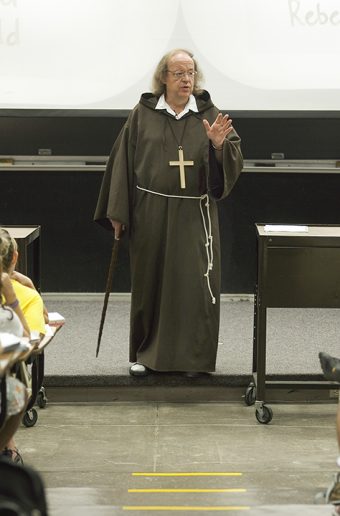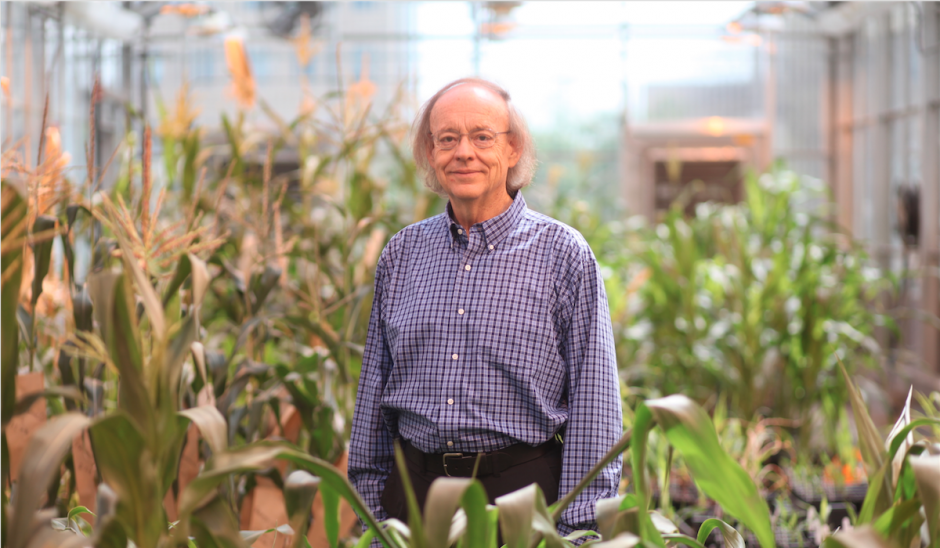“Dr. Birchler will not be able to attend today’s lecture,” teaching assistant Patrick Edger(2) announces, his voice straining over the soundtrack of Gregorian chants filling Waters Auditorium. “We were able to get a guest lecturer though. He should be coming at any second.”
The 350-plus unsuspecting undergraduates remain unfazed. It’s Friday, this is a challenging genetics course, and they hope that a substitute teacher means they won’t need to take notes. Then a man wearing a brown hooded robe with a gold wooden cross necklace, sandals and a cane descends from the back of the auditorium.
Wait. This is Jim Birchler(3).
Sort of.

“I was born Johann Mendel in [what is now the Czech Republic],” Birchler, err Mendel, says. “Not far away in Brno, there was a monastery. The abbot was interested in scientific investigations and in having me work on some of those problems.”
While incorporating historical and geographical tidbits, Birchler, Curators Professor of Biological Sciences, outlines Mendel’s biography and 19th-century contributions to genetics — all while remaining in character. This award-winning professor’s courses are known for being double helixes of instruction and entertainment, but Birchler is also known worldwide for his genomic and chromosomal research. In May 2011, he was inducted into the National Academy of Sciences — an exclusive group of distinguished scholars including past members such as Albert Einstein, Orville Wright and Thomas Edison.
Back in the classroom, he has carefully converted his entire Mendel lecture into a theatrical performance, albeit one filled with genetic concepts. He’s thought about the smallest details; diagrams originally labeled “Mendel’s experiments” have been revised to “My experiments.” And he uses self-deprecating humor to introduce vocabulary: “A phenotype is what an organism looks like on the surface. Take Dr. Birchler for example. Dr. Birchler’s phenotype is kinda chunky, bald and not too good-looking.”
Taking the lesson to a personal level, Birchler shows photos of his recent trip to the Brno monastery where Mendel crossed pea plants and developed genetic laws.
“Dr. Birchler went to find my grave there,” he says. “You can see on my grave it says ‘Father of Genetics,’ so you have me to blame for this class.”
Or thank.
Fun is the Dominant Trait
When an internationally known geneticist teaches an intense course, known by some as a weeding-out class for pre-professional biology majors, some fear is bound to be involved. Birchler keeps his students engaged and relatively calm by integrating unconventional teaching techniques, pop cultural references and wacky examples.
Nathan Swyers(4), a senior biology major from Vienna, Missouri, admits that the mechanics of genetics can be complex and boring; paying attention is paramount though sometimes a struggle. But even two years after taking Birchler’s course, he remembers how the professor explained genetic bottleneck, an occurrence during which much of a population is killed or prevented from reproducing. Rather than simply describing the phenomenon, Birchler brought flies and a fly swatter to class. Then he started whacking away.
“He can take a concept filled with scientific jargon and explain it so that you can understand it, even if you’re not a high-ranking member of the scientific community,” says Swyers, who now works in Birchler’s Tucker Hall lab.
Such demonstrations have become Birchler’s trademark. On Polyploidy Parade day, he brings to class various food products derived from polyploids — crops with more than two copies of every chromosome in the nucleus. The seedless watermelon, potato chips and boxes of cereal carry more instructional weight than any PowerPoint presentation.
Yet Birchler doesn’t hog all the genetics fun. In the 1990s, he discovered a song about protein biosynthesis in the Biochemists’ Song Book. He originally planned to have his teaching assistants sing it until he learned that Tyeece Little, manager of grants and contracts for the Division of Biological Sciences, had an operatic voice.
The song, sung to the tune of “My Bonny Lies Over the Ocean,” has numerous verses, and Little, BGS ’89, doesn’t understand a word of it. But most of Birchler’s students don’t know that.
After he finishes lecturing on protein biosynthesis, Birchler announces that a special guest will sum up the lesson. Little makes her way to the front of the auditorium and belts it out. “When I walk into the classroom, the kids wonder who I am,” Little says. “For a brief moment, I’m a scientist.”
However, Birchler’s classes are more than laugh fests. Erica Wheeler, a biology doctoral student from Victoria, British Columbia, says she’s been observing how Birchler maintains a relaxed style while delivering information-packed lectures.
“Even though people always talk about how funny he is and his humorous plays on words, he gives very well-planned and precise lectures,” says Wheeler, one of Birchler’s teaching assistants. “He’s really thought a lot about how to get these concepts across.”
Back in Sparta
“Nobody goes off to college to be a genetics professor. How did we get stuck with you?”
The student who posed this question to Birchler a few years ago was right. Birchler says he didn’t intend to become an academic or attend graduate school.
He grew up on a farm in Sparta, Illinois, and had long been interested in insects, rocks and trees. With a high school physics and chemistry teacher for a father, Birchler took advanced science classes in high school but applied to only one college: Eastern Illinois University in Charleston.
While majoring in botany there, he developed personal connections with each of his professors, one of whom became his mentor and pushed him to continue his studies. That experience stuck with Birchler, who earned his doctorate in genetics and biochemistry from Indiana University and then worked at Oak Ridge National Laboratory in Oak Ridge, Tennessee, and the University of California, Berkeley.
“Maybe if I had gone back to the farm I grew up on and become a farmer, I might be perfectly happy,” he says. “But I suspect that, because of that mentoring, I have a more interesting life than I would have had otherwise.”
After teaching at Harvard University, Birchler came to Mizzou, where he tried to figure out how he could engage students, despite the large class sizes. One day he read an obituary of a respected professor who selected students to sit in the front row. Birchler decided to run with the idea.
He calls it the Big Twelve(5). Before every lecture, he projects the names of 12 students on the board; students don’t know ahead of time if they’ve been selected, which encourages regular class attendance. Before class, Birchler introduces himself and chats with those 12 students. By the end of the semester, most students have been in the Big 12 twice.
The 12 also are given index cards. One side serves as their nametag; the other side offers them an opportunity to ask Birchler a question. He posts the questions and his answers on Blackboard, an online instructional tool. The queries mostly relate to the lecture or genetics in general. Others are jokes or questions about Birchler himself. For example:
Q: What is the point of long-term monogamous relationships that humans, whales and wolves have? A: The generally accepted explanation is that both sexes help raise the offspring, which increases their survival rate.
Q: What can go up a chimney down but not down a chimney up? A: An umbrella.
Q: Why do you and John McCormick schedule your tests on the same mornings? You guys are killin’ me! A: I realize that having organic chemistry tests on the same day as genetics leads to too many ions in the fire, but you’ll learn to plan ahead.
“The Big 12 is not just for me to get to know the students, to get feedback on lectures, to be amused by some of their interesting questions,” he says. “All of those things are entertaining, but it’s also a way for students to learn something about the professor in a huge auditorium.”
One of Birchler’s former students, Ryan Donohue(6), BS ’09, says halfway through the semester, the professor saw him on campus and addressed him by name.
“He knew exactly who I was, where I sat, what my grades were in his class,” Donohue says. “I’ve never had a teacher like that.”
Cloning Himself
Take one look at his hair, and you’ll suspect Birchler’s a scientific genius. His graying, flyaway tresses and round glasses call up the likes of Einstein or Benjamin Franklin. Birchler just plays along. When a student asked when his last haircut was, he responded: “Can’t remember — maybe 20 years ago.”
In all seriousness, he’s an accomplished researcher. So accomplished that some people think there are two Jim Birchlers, says Chris Pires, professor of biological sciences.
“A fly scientist will say to him, ‘Do you know there’s another Dr. Birchler who studies corn?’ He’s brilliant but not self-promoting. That’s why people don’t know it’s the same guy doing corn and fruit fly research.”
Birchler is considered one of the world’s leading maize geneticists. Fifteen of his papers have become classics; they’ve been cited every year since they were published, totaling more than 2,000 citations since 1980.

He’s reluctant, though, to identify a favorite discovery or experiment: “If you ask a parent, ‘Who is your favorite child?’ what are they going to tell you? Even if they had a favorite child, would they admit it?” he asks with a grin.
His longstanding research area, however, has been gene regulatory mechanisms. He’s known for advancing the gene balance hypothesis in plants with maize and in animals with Drosophila flies. Multiple proteins interact with one another to form macromolecular complexes. Birchler’s research has shown that each protein in the complex must be produced in proportion, otherwise the gene balance is disrupted. The imbalance changes how the genes are expressed, resulting in, for example, a shorter plant.
Birchler also led the MU team that created the first engineered mini-chromosomes in maize and then attached genes in targeted places on those mini-chromosomes. Before this method, genes were shot into chromosomes, but scientists had limited control of where they would end up. The technique could lead to the development of proteins and metabolites with medicinal benefits, third-generation biofuels and better crops that are resistant to viruses, insects, fungi, bacteria and herbicides.
But Birchler doesn’t boast about his research prowess unless he’s trying to recruit faculty or student researchers. When Birchler heard that his former student Tom Ream, BS ’02(7), was applying to an out-of-state research program, for example, he convinced him to consider taking an internship in an MU lab. After that experience, Ream decided to attend graduate school at Washington University and is now a postdoctoral research associate at the University of Wisconsin–Madison.
“I wasn’t going to apply to grad school at first, but Jim was very encouraging,” Ream says. “He helped me understand the whole process and the opportunities I’d have after grad school versus if I didn’t attend.”
Pointing students in the right direction has become one of the most rewarding aspects of the job, Birchler says. “It’s gratifying when a diamond in the rough has no idea what he wants to do with his life, and you give him an opportunity, and he goes on to do very well.”
After being entertained in his lectures and learning about him through the Big 12, students find themselves keeping in touch with Birchler long after final grades are posted. Third-year medical student Blake Corcoran(8), for example, approached Birchler after taking the undergraduate genetics class, and he began working in his lab to paint maize chromosomes. Corcoran says Birchler became a solid mentor.
“He reminds me of the guy I would picture Albert Einstein hanging out with,” says Corcoran. “He’s intelligent enough to still be challenging to a guy like Einstein, but he’s also always up for a good time.”
Playing the Part
When Jim Birchler was a postdoc at the University of California, Berkeley, he met a professor who was known for dressing up as various biology luminaries, such as Gregor Mendel and Charles Darwin.
He decided to adopt the idea in the early 1990s, but his first challenge was finding a monk’s outfit. Because it was fall, he searched the Halloween costume racks at Toys “R” Us but only found a grim reaper outfit.
“The first couple of times I did it, that’s what I wore,” he says. “But it was for kids, so it was just a bit form-fitting for an old man who’s become built for comfort, not for speed.”
After retiring the reaper costume, he tried Gotcha, the costume store in downtown Columbia, and found the current monk’s outfit. When he brought the costume up to the counter, the cashier asked how long he wanted it for.
“Oh, give me about 20 years,” Birchler responded.
The cashier explained that the monk’s costume was for rent, not sale.
“Do you ever remember renting this costume?” Birchler recalls asking the employee, who replied no. “So, if I buy it from you, you’ll make more money than if you keep it on the rack.”
After negotiations, Birchler paid the employee $50 cash for the costume and swore not to tell the manager. It has become his trademark ever since.
“When I see students on campus, they’re always like, ‘You’re the guy who dressed up as Gregor Mendel.’ Although one time on a student evaluation at the end of the class, one wrote, ‘I like the fact that Dr. Birchler dressed up as Charles Darwin.’ ”
Birchler laughs. “Well, I guess I really failed with that one. But I always thought that was amusing.”
Notes
1-Verdin, MA ’10, a former MIZZOU magazine staff writer, now directs marketing and communications at Nicholls State University in Thibodaux, Louisiana.
2-Edger earned a doctorate in 2012 and is now assistant professor of horticulture at Michigan State University in East Lansing.
3-Birchler has since lost 50 pounds.
4-Swyers is now working on a doctoral degree at MU.
5-Since MU’s move to the SEC in 2012, Birchler added four students to the group and renamed this technique The Sweet Sixteen.
6-Donohue is now enrolled in a doctoral program at the Mayo Clinic in Rochester, Minnesota.
7-Ream is now a scientist at Monsanto in St. Louis.
8-Corcoran earned a medical degree at MU in 2012 and is now assistant professor of Family, Community and Preventive Medicine at Drexel University in Philadelphia.




